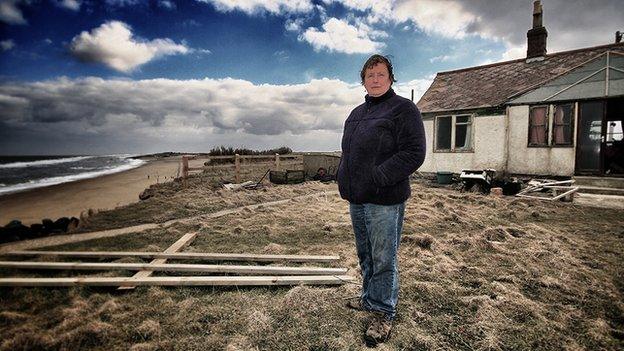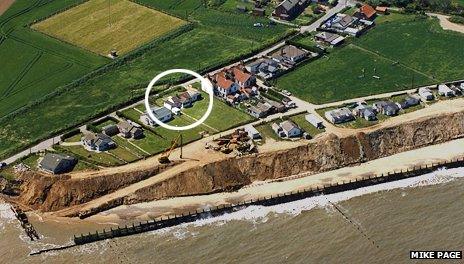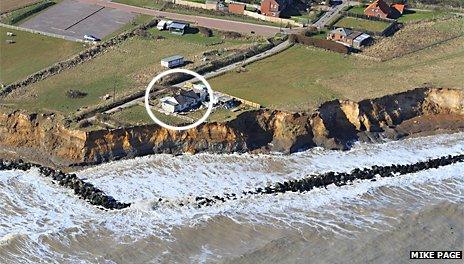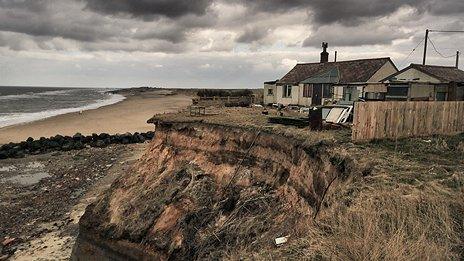Happisburgh: Last Beach Road cliff-top resident 'frightened'
- Published

Life on the cliff edge is now getting "really very serious", said Ms Nierop-Reading
There's no doubt Bryony Nierop-Reading's bungalow has what she refers to as "the million dollar view".
But perching just 28ft (8.5m) from certain doom, her home at Happisburgh in Norfolk brings a whole new meaning to living on the edge.
Great chunks of land have fallen around her beloved house since she moved to erosion-hit Beach Road five years ago.
But this winter has really taken its toll, and for the first time the retired teacher and grandmother-of-six has to admit she is starting to feel "threatened" and "frightened" by the creeping coastline.
"I work on the assumption that if the house becomes seriously unsafe that my cats with their uncanny perceptions will yowl and not want to be in the house, but I'm told that I'm wrong on this and cats can equally well fall over cliffs," said Ms Nierop-Reading.
"But I do feel threatened now because of the rate at which it is going on the corner. I'm frightened sometimes, which I haven't been up until now."
A year ago virtually all of Ms Nierop-Reading's neighbours moved out after taking compensation from the council.
However, £53,000 was not enough to sway her, and she is now the last permanent resident living on the crumbling cliff top.
Erosion has threatened north Norfolk's idyll landscape for centuries, with communities such as Whimpwell and most of Eccles now consigned to historical records.

In 1998 Ms Nierop-Reading's bungalow was separated from the cliff face by a garden, road and neighbours.

Nearly 15 years later Mother Nature has left the property just metres from a sheer drop to the beach.

Ms Nierop-Reading said she may have to make the property's footprint smaller by pulling the bathroom down if the cliff edge gets much closer.
But now it is Happisburgh's turn, and after a recent clear-up on the beach below, Ms Nierop-Reading reckons she only has about three years left before she is forced to go.
"It's actually getting very serious," she said.
"Unfortunately North Norfolk District Council took away all the unsightly stuff at the corner on the beach and the revetments, which although damaged broke the force of the waves. So I am now being put under threat diagonally from the East.
"I lost a largish chunk - about 10ft - about two or three months ago. On March 4th I was shining the torch along the next remaining bit of fence to show people what was there. The next morning, I looked out of my window and the next section of fencing was falling over the cliff.
"On the 13th the cliff was up to the next fencepost, so it's going very, very fast."
But the 1930s timber-framed bungalow has become more than just a home for Ms Nierop-Reading. It has become her platform for protest, believing successive governments have failed to fully address the threat of the sea.
Recent Environment Agency statistics show about 200 properties in England are vulnerable to coastal erosion, with 2,000 predicted to become vulnerable over the next 20 years.
'Feel the house lifting'
Current government policy states it is not possible to prevent all areas from erosion, but "action is being taken to manage the risks and reduce its impact".
But despite the risks - having that sea view day-in, day-out is what Ms Nierop-Reading says will keep her going right until the very end.
"I've had windows broken by the wind hurling things at me and I've definitely got tiles off the roof. When the wind is blowing and gusting furiously I can feel the house actually lifting slightly as it gets underneath.
"There are ripples going across my glass of water beside my bed and the glass in the windows bows - that's frightening.
"I knew one day I'd go, but what I'm more concerned about is the fact that we still have this stupid piecemeal policy right round the coast and there is no political will at a high level to save the coastline.
"But it doesn't put me off. I call it my 'million dollar' view. People say, 'Why didn't you take the £53,000 I was offered and run?'. My view is worth infinitely more than that.
"Either that or I'm just plain stupid. Take your pick."
- Published6 October 2012
- Published10 April 2012
- Published11 July 2011
- Published5 July 2011
- Published28 April 2011
- Published4 February 2011